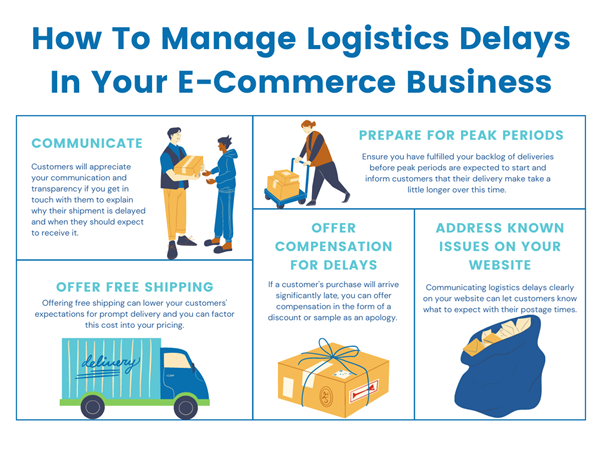Managing Logistics Delays In Your E-Commerce Business
December 9, 2022
The COVID-19 pandemic has led to an exponential increase of people shopping online and spending their discretionary income on consumer goods. This increase in parcel volumes has caused logistics systems to become slower and more expensive, which is only further exacerbated by the reduction of passenger flights that hold air freight.
For e-commerce businesses, shipping delays can impact your reputation and customer retention. If a purchase is not delivered within two days of the expected delivery date, 69% of buyers said they would be less likely to shop with that business again.
With Christmas right around the corner, pressure on our postal system is only increasing. Whilst that has come to be expected at this time of year, it is best to manage your customers’ expectations in advance. Business Foundations has created a guide on how you can best manage logistics delays in your small business.
1. Communicate
Communication is key for businesses experiencing logistics delays. Your business should be getting in touch with customers as soon as you find out their shipment has been delayed and explain to the customer why they will not receive their order on time. Customers are far more likely to be understanding of the delay if you communicate with them, rather than receiving radio silence. If possible, you should also give them an estimate of when their package will arrive to ease their concerns or frustrations about the delivery process.
2. Offer Free Shipping
If you cannot guarantee that customers will receive their orders on time, you might consider offering free shipping to lower your customers’ expectations for speedy delivery. The cost of offering free delivery can be factored into your product pricing if you are worried about your profit, and your customers won’t expect next day delivery if they have not paid for it. These lowered expectations can allow you to under promise and over deliver when possible.
3. Prepare For Peak Periods
With the Christmas period fast approaching, the postage system is about to be flooded with people ordering their gifts online. Your business should prepare for this by informing customers that shipping may be delayed due to the peak Christmas period. It is also important to ensure that all pending shipments have been posted before the December period to reduce the compounding of delays.
4. Offer Compensation For Delays
When delivery delays are outside of your control, you can send your customers a small token of compensation to keep them loyal to your business. Examples of compensation could include a discount with their next purchase or a sample of a product. This should only be used for delays of over five business days, it is not worth offering compensation if the customer only has to wait an extra day or two.
5. Address Known Issues On Your Website
If you are experiencing widespread or known delays with your shipping, then this should be communicated clearly on your website. You could include a disclaimer that says shipping times are longer than normal due to COVID-19 or the Christmas period. By addressing the delays upfront, customers will know what to expect and are less likely to take their frustrations out on your business.

Shipping delays are likely to continue for the foreseeable future, therefore it is important that e-commerce businesses have a strategy in place for how they will manage their customers during a delay. With regular communication, customers will appreciate your transparency and be more understanding of the issue at hand.
Acknowledgement Of Country
Business Foundations acknowledges the traditional custodians throughout Western Australia and their continuing connection to the land, waters and community. We pay our respects to all members of the Aboriginal communities and their cultures; and to Elders both past and present.
Victoria
The Commons
80 Market Street,
South Melbourne VIC 3205
admin@businessfoundations.com.au
Western Australia
Wesley Central
2 Cantonment Street,
Fremantle WA 6160
admin@businessfoundations.com.au


Get In Touch
Have a question or to find out how we can help you, please get in touch.






